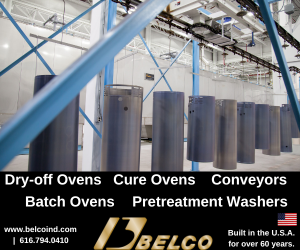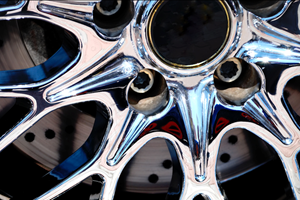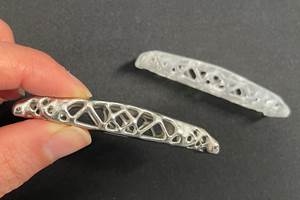How Duplex Electroless Nickel Coatings Can Be Advantageous
As applications for electroless nickel (EN) coatings continue to expand, Met-Chem’s Mike Aleksinas explains how it has become obvious that one type of EN cannot possibly meet all the physical/mechanical properties that a specific application may require.
Q: I own a plating shop in the Northeast, we have been plating electroless nickel (EN) for over 30 years. It has been brought to my attention that the use of duplex EN coatings can be advantageous for different applications. Can you provide information on this subject and what could I achieve?
A: That is an excellent question, and yes, a significant amount of attention has been placed on this subject in recent years. As applications for electroless nickel coatings continue to expand, it has become obvious that one type of EN (for example HP, MP, LP, Composite EN and more) cannot possibly meet all the physical/mechanical properties that a specific application may require. Duplex coatings have provided that possibility.
Double-layer (or duplex) EN coatings typically involve the combination of two types of EN deposits to create a better finish of either single layer EN. There are numerous examples of these coatings already in use in the metal finishing industry. Some of the properties that can be improved for specific applications are as follows:
- Improved corrosion resistance
- Better wear resistance
- Better lubricity and release properties
- Longer bath life on aluminum
- More reflective deposits
- Blackening of the deposit
The advantage of duplex coatings is that they can achieve several of the properties outlined above whereby a single layer EN deposit might only achieve one. Here are samples of current duplex coatings:
High Phos EN over Low Phos EN: When high hardness and wear resistance may be required of an EN deposit, low phosphorus EN is typically recommended. However, as a single layer, the corrosion resistance of low phosphorus EN is generally poor. If an underlayer of high phosphorus EN is plated first, the duplex coating can provide both wear resistance and corrosion protection.
Composite EN over High Phos EN: When an application requires corrosion resistance along with good lubricity and release properties, a single layer high phosphorus EN coating may not be capable of achieving this. However, utilizing a top layer of EN/PTFE or EN/BN, one can provide a deposit with a lower coefficient of friction and/or better wear resistance. However, since composite coatings are generally very porous, they provide little corrosion protection. The combination, however, of utilizing both the high phosphorus EN as an underlayer and a topcoat of composite EN, properties of both chemistries can be achieved on the same part.
Bright Mid-Phos EN over High Phos EN: In certain applications the appearance of the EN deposit is critical. Replacing bright electrolytic EN with midphosphorus EN has quite often been employed. Where midphosphorus EN deposits will provide the finish required for most applications, it may not provide the additional corrosion resistance that some applications may also require. Plating a bright midphosphorus layer over a high phosphorus EN layer can provide both a bright deposit with corrosion resistance.
Mid- or High-Phos EN over an Alkaline EN Strike: The bath lives of most acid electroless nickel chemistries are shorter when plating aluminum substrates than steel substrates. However, recent advancements have demonstrated that introducing an alkaline EN strike prior to the acid EN deposit not only extends the bath life of the acid EN chemistries but also improves adhesion in some cases. Reduced plating costs have also been realized as a result.
Matte Low Phos EN over High Phos EN: Recent developments have also found plating certain low phosphorus EN deposits over a high phosphorus EN layer can provide an excellent coating for black finishes. By applying an easy-to-oxidize low phosphorus EN coating over a corrosion-resistant high phosphorus EN layer, a shiny or matte black finish can be created for a multitude of applications.
In summary, electroless nickel duplex coatings offer a range of properties that can create many new applications now and in the future. By combining the different EN coatings available today, more versatility can be achieved than any single layer coatings of the past.
Mike Aleksinas is the president of MetalChem. He can be reached at mike@metalchem-inc.com or at 864-877-6175.
Related Content
A Chromium Plating Overview
An overview of decorative and hard chromium electroplating processes.
Read More3 Tests to Ensure Parts are Clean Prior to Plating
Making sure that all of the pre-processing fluids are removed prior to plating is not as simple as it seems. Rich Held of Haviland Products outlines three tests that can help verify that your parts are clean.
Read MorePossibilities From Electroplating 3D Printed Plastic Parts
Adding layers of nickel or copper to 3D printed polymer can impart desired properties such as electrical conductivity, EMI shielding, abrasion resistance and improved strength — approaching and even exceeding 3D printed metal, according to RePliForm.
Read MoreAn Overview of Electroless Nickel Plating
By definition, electroless plating is metal deposition by a controlled chemical reaction.
Read MoreRead Next
A ‘Clean’ Agenda Offers Unique Presentations in Chicago
The 2024 Parts Cleaning Conference, co-located with the International Manufacturing Technology Show, includes presentations by several speakers who are new to the conference and topics that have not been covered in past editions of this event.
Read MoreDelivering Increased Benefits to Greenhouse Films
Baystar's Borstar technology is helping customers deliver better, more reliable production methods to greenhouse agriculture.
Read MoreEpisode 45: An Interview with Chandler Mancuso, MacDermid Envio Solutions
Chandler Mancuso, technical director with MacDermid Envio discusses updating your wastewater treatment system and implementing materials recycling solutions to increase efficiencies, control costs and reduce environmental impact.
Read More

























